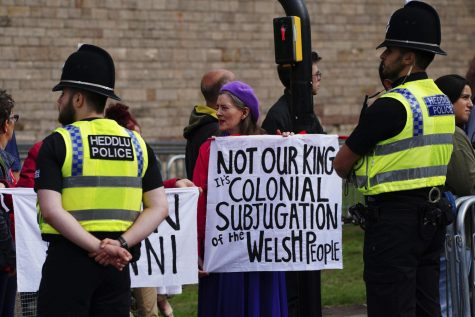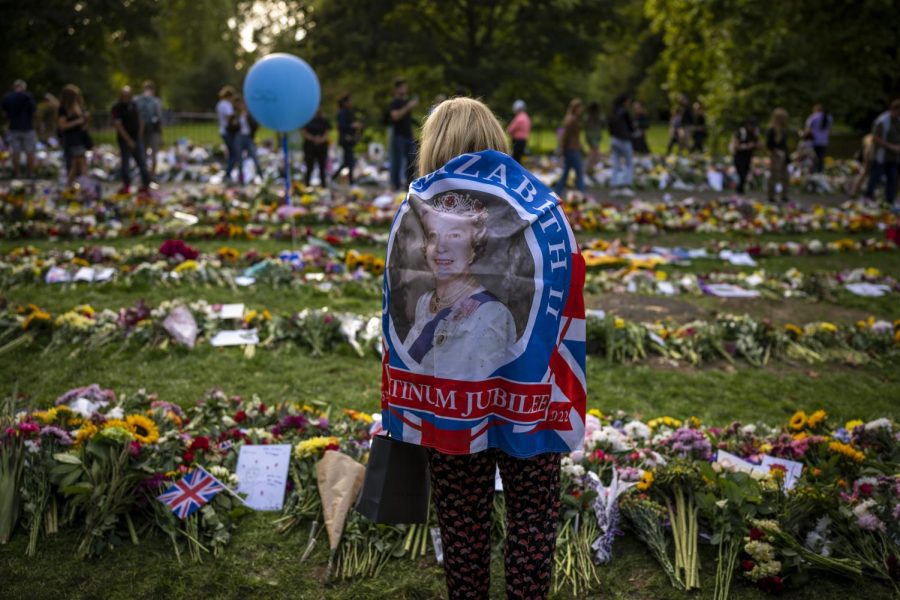Great Britain and the cult of the monarchy
A woman carrying a flag with Queen Elizabeth’s image stands at Green Park memorial, next to Buckingham Palace in London, Sunday, Sept. 11, 2022.
Sep 23, 2022
On Sept. 8, Elizabeth II, the Queen of England for over seven decades, passed away at the age of 96. It rocked the world. It was one of those events we all knew instinctively would happen one day but nevertheless were unprepared for. Sympathies from across the globe flooded into the United Kingdom as Britons prepared for King Charles III, the first new monarch since the 1950s.
However, in my opinion, the Queen’s passing showcased prominently that even in the modern era, the cultish sycophancy inherent to the political system of monarchy persists.
On one hand, I do suppose this makes sense in a way. Queen Elizabeth ruled for 70 years and became a global cultural icon. It stands to reason that people, especially Britons, would act emotionally en masse at the news. I’m not disputing that. What I do take issue with is how institutionally demanding this mourning was.
It was long planned out that once the Queen died, the entire nation would undergo a full ten days of mourning, culminating in her funeral. Soccer matches and other big events were canceled. The BBC canceled any and all comedic programming for a couple of weeks. Notably, many Britons were surprised to find that their doctor’s appointments were canceled due to the Queen’s funeral.
Now once again, I get it. A country lost its national symbol. I don’t expect them to simply brush it off and move on. But it gets to a certain point where it simply becomes excessive. There are zero reasons that someone’s doctor’s appointment (which includes pre-op check-ups and test screenings) should be canceled for something as frivolous as a “mandatory state of mourning”. And, call it the American in me, but if the President of the United States (god forbid) passed away on Saturday, I’d still be able to watch the Cleveland Browns disappoint me on Sunday.
All this isn’t even getting into how sucked in many Britons seem to be over the mania. Many know the massive mile-long lines that formed as the Queen’s coffin was transported throughout the UK. A crowd gathered outside Buckingham Palace shortly after the news was dropped and sang the country’s national anthem, “God Save the Queen.” Tears were shed. All across England, people displayed exaggerated shows of mourning.
As it turns out, these grandiose displays might be for their betterment, as in the time since the Queen’s passing, British police have cracked down on anti-royalist protestors, arresting many for infractions such as “breaching the peace”. Perhaps the most famous example of this went down on Sept. 12, when the Queen’s procession moved through Edinburgh, Scotland. Part of the procession was the disgraced Prince Andrew, who was previously stripped of his royal duties and made into a persona non grata after his extensive connections to Jeffrey Epstein were revealed. As the procession steadied on, a young Scottish man shouted, “Andrew, you’re a sick old man!” He was then promptly arrested.
Once again, I get it. There’s a time and a place and so on and so forth. But what gets me is the reaction of those surrounding him. After he speaks, his yells are immediately drowned out by cries of, “God Save the King!” until two random men assault him. If a woman had not verbally broken things up as the police arrived, a full-on brawl might have erupted. If you have problems with his decorum, sure, fine, whatever. But the outside-looking-in perspective is that a citizen called out a royal for being an alleged sex pest (for what it’s worth, Andrew fully denies the allegations) and the crowd took Andrew’s side.

Even non-verbal forms of protest have been under scrutiny. Many protestors have been arrested for simply holding up signs displaying anti-imperialist and anti-royalist messages. It is truly times like these that, despite its constant abuse by bad faith actors, I am incredibly grateful for the First Amendment and all it entails.
Simply put, the atmosphere created by the British state, as well as the royalist public, resembles a quasi-North Korean cult of personality centered around the Royal Family and predominantly Queen Elizabeth. The breaking point for me was the recent development that the Holocaust Memorial Garden in Hyde Park was turned into a mini shrine for the Queen. Yes, you did in fact read that correctly. It has since been removed, but that just goes to showcase how delusional royalists can be at their very worst.
The worship around the Royal Family really gets fun when talking about finances. At the time of her death, Queen Elizabeth had a net worth of £370 million (roughly $420 million), along with nearly $500 million in assets and various properties around the globe. Contrast this with the average British yearly salary of only £39,700 ($45,200) and a stagnating British economy with skyrocketing costs of living. The absolute cherry on top is that the Queen’s lavish funeral (which took place on Monday) was financed not by the Royal Family’s vast amounts of wealth, but rather out of the taxpayer’s pocket. But hey, according to Michelle Donelan, Britain’s Culture Secretary, forcing an increasingly poor nation to foot the bill for a rich lady’s funeral is “money well spent.”
The Queen’s death also reignited debate over the British Empire and its role in colonizing and destabilizing much of the Third World. While many threw harsh criticisms at the UK for its extensive history of colonization (which, despite what some say, Elizabeth did in fact play a role in), others were quick to defend it, with some absolute geniuses proposing we bring it back! To give you an idea of just how potent royalism is on the brain, we even had Americans defending the British Empire as a “civilizing force” (which in and of itself was a longtime justification for building empires). Now, this might just be me flaunting my History minor, but I’m fairly certain we had an entire war over not having to do that.
Ultimately, the Queen’s passing has triggered a royalist fervor throughout Britain, and I fear it’s only getting worse. From cult-like worship of the Royal Family, to justifying empire, to the continued attacks on Meghan Markle for the crime of being a black woman, England is going to have to come to grips with itself over how it wants to behave in the modern age.
Now normally, when I go on one of these tangents, I usually end it with a call to action. We should do this, we should do that, so on and so forth. What I want to say is, “abolish the monarchy”, but I recognize that I really don’t have a place to speak here. I’m just some rando 20-something from Ohio. No player in British politics worth their salt is going to read this and say, “Oi, that’s a good point there, innit?”. This dronish sycophancy and the system it perpetuates is a problem Britain will have to sort out on its own, while I complain and moan from across the pond.
And who knows what the future has in store? Though the monarchy is still popular in Britain, the incoming King Charles is somewhat unpopular, especially when compared to his icon of a mother. Perhaps replacing a polite old lady with a grouchy old codger will lead Britons to start seeing the monarchy, and the cult of personality enabling it, in a different light.













